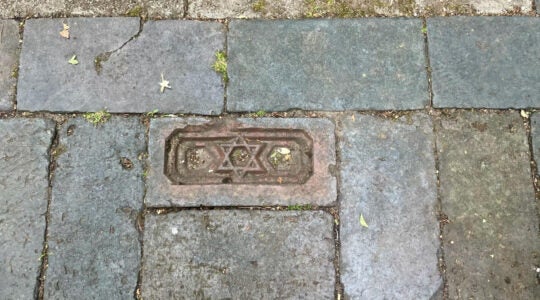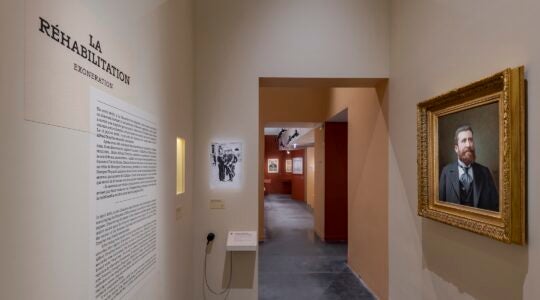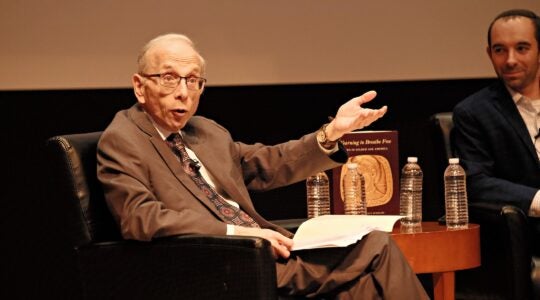Jerusalem — How do you explain to an American Jew who hasn’t visited Israel how safe one feels being there? Or that many Israelis really do enjoy their lives, despite the constant tensions they live with every day?
And how do you make an Israeli who has not spent much time abroad understand what “Jewish identity” means to an American Jew? It’s an alien concept to large numbers of people in the Jewish state who have no need to parse the Jewish and Israeli aspects of their DNA, and see themselves simply as Israelis.
While the Herzliya Conference on National Security I attended last week devoted several sessions to the Israel-diaspora relationship, which professionals and academics see as drifting further apart and in deep trouble
(more on that later), several experiences my wife and I had during our 12 days in Israel underscored other aspects of the gap between American and Israeli Jews.
For example, we spent a Shabbat with friends in Efrat, a mixed community of about 10,000 Anglos and native Israelis on the West Bank. Efrat is a quiet, idyllic setting to many who live there and is considered a provocative, if not dangerous, settlement to many others.
Mentioned in the Torah as the place where the matriarch Rebecca died, it is in the Gush Etzion bloc of settlement communities that have powerful historical and emotional ties to Israelis who remember that some 250 men, women and children were massacred there by Arab armies in May 1948. As a result, the Gush Etzion bloc was among the first West Bank areas settled by Jews after the Six-Day War of 1967 — many of them relatives of those who were slain — and is considered to be part of the “consensus settlement” areas that will remain under Israeli control if and when a peace agreement is reached with the Palestinians.
Founded in 1982, in part by Shlomo Riskin, who left Lincoln Square Synagogue on Manhattan’s West Side to become the chief rabbi of Efrat, the community has become the home of a number of observant Jews from the New York area and is well known in Modern Orthodox circles. But in Israel, we found many people, including cab drivers, who either never heard of the community or would not travel there in fear for their safety.
During the height of the second intifada, the road south from Jerusalem to Efrat was indeed treacherous, and a number of people were killed by snipers from the Arab villages. Today, one drives only a few feet from the security barrier built alongside the road, and as a result, terrorism has decreased significantly.
Still, Efrat continues to be a scene of controversy from time to time when the community’s efforts to expand to accommodate its growth are contested by Palestinians as well as Israelis and others opposed to the settlements. Efrat now encompasses homes on seven hills, and hopes to build more on the eighth.
Protected by fellow congregants on guard duty, we prayed in a makeshift building, one of the community’s 22 synagogues. At a Kiddush after services, more than a hundred worshippers stood outside in the chilly sunlight, catching up on the social news of the week, much as their counterparts in America might do. But the setting was quite different, offering a panoramic view of Bethlehem to the north and the stony hills of an Arab village to the east.
We were surprised that many residents are casual about locking their doors at night, and that homes are at a premium and going up in price, despite concerns that the government — highly unpopular among Jews living in the West Bank — might be prepared to cede communities like Efrat in a peace deal.
“Who knows?” people shrugged, when asked about the future. For now, they say, life is good.
But our sense of security was shaken later in the week when we read of a terror attack at a Gush Etzion yeshiva nearby, yet another reminder that violence is never far from the Israeli psyche or experience.
Perhaps that is why Israelis seem particularly adept at compartmentalizing their lives, separating the existential threats of a nuclear Iran, violent neighbors and a largely hostile world from the daily experiences of enjoying the company of family and friends at an outdoor café, celebrating marriages with pure joy and trying their best to live life to the fullest.
Many of the former Americans we met during our visit expressed sadness for those they left behind, raising children in the diaspora rather than in a Jewish state; no doubt many American Jews, in turn, feel badly for Israelis, who see their sons go off to army service and live in constant worry about their fate.
But at least those Jews are thinking about each other. On a larger scale, the Israeli-diaspora relationship is a “painful one” and “becoming increasingly distant,” according to Professor Yehezkel Dror, founding president of the Jewish People Policy Planning Institute in Jerusalem. Addressing the Herzliya Conference last week, he painted a gloomy picture for the future and said “radical measures” are needed to improve the situation.
He asserted, for example, that a number of basic assumptions no longer apply, like Israel as the safe haven for Jews everywhere and as the center of the Jewish world. “This must be attained, not just declared,” said Dror. Noting that even elite Israelis are “complete ignoramuses” on the subject of diaspora Jewry, he called for far more consultation between Israeli and diaspora leaders in making decisions that affect all Jews, like the place of Jerusalem as the capital of Jewish civilization.
Len Saxe, a Brandeis University sociologist, offered a far brighter picture in his presentation, focusing on the success and growth of birthright israel, which each year brings tens of thousands of young Jews (between 18 and 26) for a free 10-day trip to Israel. He said his studies have found that, contrary to conventional wisdom, young diaspora Jews today want “meaningful connections” and are actually more engaged” than were others their age in the past.
While the discussion and debate goes on among academics, it is clear that in many ways, not only is the rift between diaspora and Israeli Jews growing wider, but fewer and fewer people care. That is more than a shame because both groups will be the poorer unless more far more effort is made to help Jews in and outside of Israel better understand each other, their common heritage, and what they have to lose if they go their separate ways.
The New York Jewish Week brings you the stories behind the headlines, keeping you connected to Jewish life in New York. Help sustain the reporting you trust by donating today.





